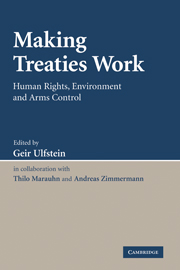Book contents
- Frontmatter
- Contents
- Preface and acknowledgments
- Notes on the contributors
- Table of cases
- Table of treaties and other international instruments
- INTRODUCTION
- PART I INTERNATIONAL HUMAN RIGHTS
- PART II INTERNATIONAL ENVIRONMENTAL LAW
- PART III INTERNATIONAL ARMS CONTROL
- GENERAL COMMENTS
- 14 Dispute resolution
- 15 Compilance control
- 16 Enforcement
- Index
14 - Dispute resolution
Published online by Cambridge University Press: 05 September 2009
- Frontmatter
- Contents
- Preface and acknowledgments
- Notes on the contributors
- Table of cases
- Table of treaties and other international instruments
- INTRODUCTION
- PART I INTERNATIONAL HUMAN RIGHTS
- PART II INTERNATIONAL ENVIRONMENTAL LAW
- PART III INTERNATIONAL ARMS CONTROL
- GENERAL COMMENTS
- 14 Dispute resolution
- 15 Compilance control
- 16 Enforcement
- Index
Summary
Dispute settlement in a fragmented legal order
In the twenty-first century, we are witnessing an astonishing revival of judicial instruments in international law: from the increasing use of the International Court of Justice by States to the establishment of the International Criminal Court, of the Dispute Settlement Body of the World Trade Organization and also of the International Tribunal for the Law of the Sea. Even the services of the Permanent Court of Arbitration established in 1907 are increasingly used. On the other hand, when browsing through the relevant political science literature, one hardly finds an explanation for this development. International adjudication is supposed to be slow, cumbersome, expensive and, ultimately, ineffective. Recently, American scholars have attempted to undermine the last prerogative of international courts and tribunals, namely, the presumption of impartiality, neutrality and fairness. Submission to international adjudication would thus appear to be exceptional and risky. And yet, States are using judicial bodies with increasing frequency, in particular in issue areas such as world trade or international criminal law. In addition, recent studies indicate that the compliance with international judicial pronouncements is in general positive.
The example of international criminal law demonstrates that the development of dispute settlement is far from uniform. International criminal courts and tribunals deal with the violation of international legal rules by individuals, whether acting on behalf of States or not. Recent developments thus point to a certain ‘fragmentation’ of dispute settlement in different areas of international law.
- Type
- Chapter
- Information
- Making Treaties WorkHuman Rights, Environment and Arms Control, pp. 351 - 372Publisher: Cambridge University PressPrint publication year: 2007
- 2
- Cited by



